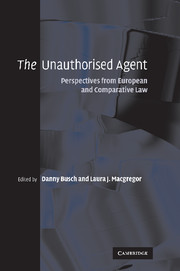Book contents
- Frontmatter
- Contents
- List of contributors
- Foreword
- Preface
- Abbreviations
- Table of cases
- 1 Introduction
- PART 1 The civilian legal systems
- 2 Unauthorised agency in French law
- 3 Unauthorised agency in Belgian law
- 4 Unauthorised agency in German law
- 5 Unauthorised agency in Dutch law
- PART 2 The common law
- PART 3 Mixed legal systems
- PART 4 International ‘codes’
- PART 5 Conclusions
- Bibliography
- Index
4 - Unauthorised agency in German law
Published online by Cambridge University Press: 07 September 2009
- Frontmatter
- Contents
- List of contributors
- Foreword
- Preface
- Abbreviations
- Table of cases
- 1 Introduction
- PART 1 The civilian legal systems
- 2 Unauthorised agency in French law
- 3 Unauthorised agency in Belgian law
- 4 Unauthorised agency in German law
- 5 Unauthorised agency in Dutch law
- PART 2 The common law
- PART 3 Mixed legal systems
- PART 4 International ‘codes’
- PART 5 Conclusions
- Bibliography
- Index
Summary
Introduction
Agency is a legal device which enables an effective division of tasks within an economic system. Under German law, agency is understood as a concept which is separated from the underlying relationship, which in most cases is a contract to provide a service or a mandate contract. Agency takes place when one person, the agent, performs a legal act in the name of another, the principal. The most common legal act an agent would perform in the name of the principal is the conclusion of a contract with the third party.
Unauthorised agency (Vertretung ohne Vertretungsmacht) takes place when the legal act performed by the agent is not authorised by the principal whether there is an underlying contractual or other relationship or not. Consequently, questions as to the validity and enforceablity of contracts concluded with third parties will come to light. German law provides a comprehensive mechanism for dealing with issues arising out of acts of agents lacking authority. There are different situations in which an unauthorised agency may take place, such as when the agent has no authority or when he merely exceeds his authority. The main difficulty with unauthorised agency lies in the lack of control on the part of the principal. It is this lack of control which carries with it questions of liability, and/or extent of liability, of either the agent or the principal.
- Type
- Chapter
- Information
- The Unauthorised AgentPerspectives from European and Comparative Law, pp. 100 - 135Publisher: Cambridge University PressPrint publication year: 2009
- 2
- Cited by

